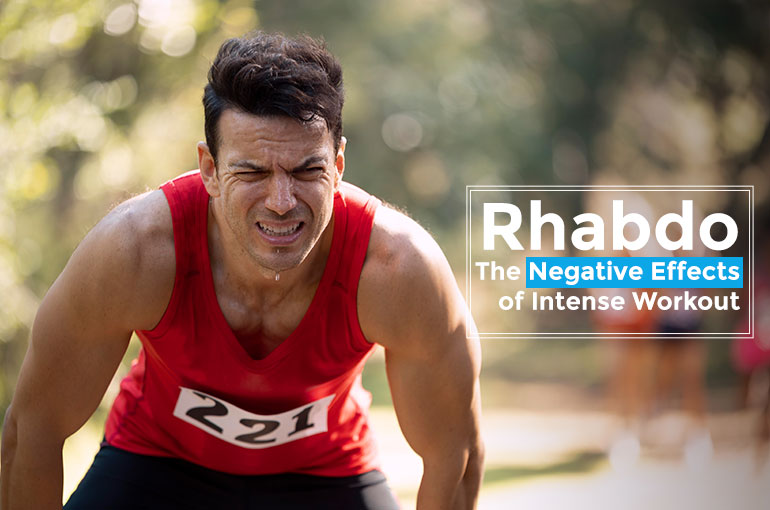
Most of us are aware that injuring oneself by rushing into an extreme workout after several months of inactivity. For weekend warriors, that often translates to pulled muscle or shin splints. Rest, a heating pad or ibuprofen are often effective treatments for most of these adverse effects.
Not so with rhabdomyolysis, sometimes known as rhabdo, a terrible side-effect of intense exercise that most gym goers are unaware of.
Cases of this are rare but serious ailments, formerly thought to afflict only hardcore athletes, fitness fanatics, or military warriors, have grown increasingly widespread as strenuous exercise pursuits like extreme weightlifting, ultrarunning, and spinning gain popularity.
Rhabdo: What Is It?
Rhabdomyolysis, as it is often known, is a potentially fatal condition characterized by excessive muscle breakdown. Some muscle degradation is common after frequent exercises. This breakdown causes the muscles to regenerate and become stronger.
When your body Is under too much stress, the muscular fibers are damaged, and rhabdo might occur. The majority of occurrences of this illness occur when a person pushes himself too hard in a new sports activity. Newcomers to a spine class, CrossFit facility, or session with a fitness trainer may overdo it without realizing it.
Here are the tell-tale signs
The most noticeable sign of rhabdo is dark, tea-colored urine that appears one to three days after intense activity. Many individuals misinterpret this symptom for hematuria, which is blood in the urine produced by overstretching a muscle.
This discoloration, however, is caused by a poisonous protein called myoglobin in rhabdo. These toxic proteins are released into the circulation as overused muscles break down. When these proteins accumulate in the kidneys, they might cause lasting damage. Acute renal failure is the most significant consequence of rhabdo, occurring in around 15% of people diagnosed with the illness.
Rhabdo may cause compartment syndrome, a painful disease that develops when pressure within the damaged muscles accumulates to hazardous levels, producing significant swelling and decreased blood flow. Surgery is frequently required to restore normal blood flow and prevent muscle tissue from dying from compartment syndrome.
The following are other symptoms of rhabdo:
Alcohol abuse
Certain medications
Illicit drug use
Muscle diseases
Muscle trauma
The treatment of rhabdo
Don't be panic if you feel any aches and pains after your workout. You're probably alright if you're aching all over and you can take help of a physiotherapist, to know more about your pain and get rid of it. Dr.Sumitz is one of the best physiotherapy doctor in Baner who can help you to deal with it. Rhabdo symptoms are more concentrated. However, if you are concerned that you may have rhabdo, please consult your doctor. Rhabdo can be fatal if left untreated.
If your doctor diagnoses rhabdo, treatment will involve significant volumes of fluids, including IV treatment, to flush the kidneys and help avoid damage. Most patients recover if caught early, and rhabdo is not considered a chronic illness. Hydration, an exercise break, and gradually resuming exercises under the supervision of a doctor are typically enough.
Keeping yourself safe at the gym
A difficult workout will not send most of us to the hospital on its own. However, there are a few basic things you may do to reduce your risk of rhabdo.
You can consult to a physiotherapist and work according to his guidance to keep yourself away from rhabdo and if you are
looking for physiotherapy clinic in Pune then you are at the right place.
To reduce the possibility of damage, ease into the new exercise routine gradually. It's okay to be new in class.
If you've taken a break from exercising, don't return with the same intensity as you went. Begin with less weights or a slower speed and gradually work your way back up to where you were.
Hydrate, hydrate, and then some more. Most persons who get rhabdo as a result of strenuous exercise are also dehydrated. Drink plenty of water before, during, and after any workout routine
Know your limitations and stick to them. If you are having difficulty, slow down or stop. It is OK to stop a class or request that a trainer reduces the intensity.
Before working out, avoid taking excessive dosages of creatine supplements or drinking caffeinated energy beverages.
Avoid exercising in hot and humid conditions